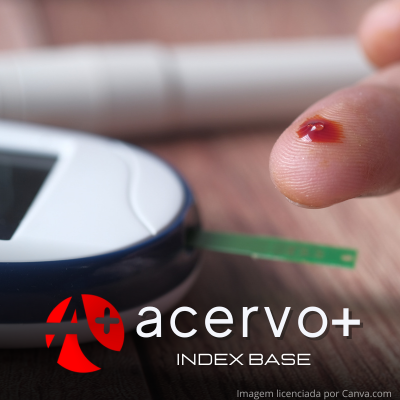Abordagem do controle glicêmico em pacientes com insuficiência cardíaca e diabetes tipo 2 associados
##plugins.themes.bootstrap3.article.main##
Resumo
Objetivo: Avaliar a abordagem do controle glicêmico em pacientes com insuficiência cardíaca e diabetes mellitus tipo 2 associado. Métodos: Trata-se de uma revisão integrativa nas bases de dados Literatura Latino Americana e do Caribe (LILACS) e PubMed, levando-se em consideração a produção científica no período de 2028 a 2023. Foram utilizados os descritores “heart failure; Type 2 diabetes mellitus; glycated hemoglobina; adults; heart disease”. Resultados: A amostra final foi composta por 05 (cinco) artigos, os quais apontaram que o controle glicêmico rigoroso pode associar-se a um pior resultado cardiovascular. A faixa de hemoglobina glicada em torno de 7% esteve associada a menos eventos desfavoráveis. Os medicamentos antidiabéticos inibidores do cotransportador sódio e glicose demonstraram eficácia na redução da morbimortalidade cardiovascular em pacientes que sofrem de insuficiência cardíaca. Considerações finais: O controle dos níveis glicêmicos tem se mostrado um importante parâmetro na redução de morte e hospitalização cardiovascular, a escolha terapêutica de antidiabéticos é de grande importância e deve visar os efeitos cardioprotetores para a insuficiência cardíaca. Entretanto, ainda há uma escassez de estudos nessa área e é necessário mais pesquisas para uma melhor elucidação de aspectos que não foram claramente delineados.
##plugins.themes.bootstrap3.article.details##
Copyright © | Todos os direitos reservados.
A revista detém os direitos autorais exclusivos de publicação deste artigo nos termos da lei 9610/98.
Reprodução parcial
É livre o uso de partes do texto, figuras e questionário do artigo, sendo obrigatória a citação dos autores e revista.
Reprodução total
É expressamente proibida, devendo ser autorizada pela revista.
Referências
2. BRASIL. Ministério da Saúde. Estratégia de Saúde Cardiovascular: instrutivo para profissionais e gestores da Atenção Primária à Saúde. 2022. Disponível em: https://www.aps.saude.gov.br. Acessado em: 13 de novembro de 2022.
3. DUNLAY SM, et al. Type 2 diabetes mellitus and heart failure: a scientific statement from the American Heart Association and the Heart Failure Society of America: this statement does not represent an update of the 2017 ACC/AHA/HFSA heart failure guideline update. Circulation, 2019; 140(7): e294.
4. FEDERAÇÃO INTERNACIONAL DE DIABETES. Atlas de Diabetes da IDF, 9ª edição, 2019. Acessado em 14 de novembro de 2023. Disponível em: https://www.diabetesatlas.org. Acessado em: 13 de novembro de 2022.
5. FITCHETT D, et al. Relationship between hypoglycaemia, cardiovascular outcomes, and empagliflozin treatment in the EMPA-REG OUTCOME® trial. European Heart Journal, 2020; 41(2): 209-217.
6. INZUCCHI SE, et al. Cardiovascular benefit of empagliflozin across the spectrum of cardiovascular risk factor control in the EMPA-REG OUTCOME trial. The Journal of Clinical Endocrinology & Metabolism, 2020; 105(9): 3025-3035.
7. JIA G, et al. Diabetic cardiomyopathy: an update of mechanisms contributing to this clinical entity. Circulation research, 2018; 122(4): 624-638.
8. JÜRGENS M et al. Effects of empagliflozin on myocardial flow reserve in patients with type 2 diabetes mellitus: the SIMPLE study. Journal of the American Heart Association, 2021; 15: e-020418.
9. KENNY HC e ABEL E. Heart failure in type 2 diabetes mellitus: impact of glucose-lowering agents, heart failure therapies and new therapeutic strategies. Circulation research, 2019; 124(1): 121-141.
10. LONG C, et al. Association of long-term visit-to-visit variability of HbA1c and fasting glycemia with hypoglycemia in type 2 diabetes mellitus. Frontiers in endocrinology, 2022; 13: e-975468.
11. MARX N, et al. 2023 ESC Guidelines for the management of cardiovascular disease in patients with diabetes: Developed by the task force on the management of cardiovascular disease in patients with diabetes of the European Society of Cardiology (ESC). European Heart J, 2023; 44(39): 4043-4140.
12. MCALISTER, FA. et al. Association between glycated haemoglobin levels and cardiovascular outcomes in patients with type 2 diabetes and cardiovascular disease: a secondary analysis of the TECOS randomized clinical trial. European journal of heart failure, 2020; 22(11), 2026-2034.
13. MONTVIDA O, et al. Long-term trends in antidiabetes drug usage in the U.S.: real-world evidence in patients newly diagnosed with type 2 diabetes. Diabetes Care 2018; 41: 69–78.
14. PALAZZUOLI A e IACOVIELLO M. Diabetes leading to heart failure and heart failure leading to diabetes: epidemiological and clinical evidence. Heart Failure Reviews, 2023; 28(3): 585-596.
15. PEDROSA HC, et al. Diretrizes Sociedade Brasileira de Diabetes 2019-2020. 2019.
16. PETRIE MC, et al. Effect of dapagliflozin on worsening heart failure and cardiovascular death in patients with heart failure with and without diabetes. Jama, 2020; 323(14): 1353-1368.
17. QUINAGLIA T, et al. Diabetic cardiomyopathy: factual or factoid?. Revista da Associação Médica Brasileira, 2019; 65: 61-69.
18. SEFEROVIĆ PM, et al. Type 2 diabetes mellitus and heart failure: a position statement from the Heart Failure Association of the European Society of Cardiology. European journal of heart failure, 2018; 20(5): 853-872.
19. SEGAR MW, et al. Association of long-term change and variability in glycemia with risk of incident heart failure among patients with type 2 diabetes: a secondary analysis of the ACCORD trial. Diabetes Care, 2020; 43(8): 1920-1928.
20. WANG MT, et al. Association between specificity of sulfonylureas to cardiac mitochondrial KATP channels and the risk of major adverse cardiovascular events in type 2 diabetes. Diabetes Care, 2022; 45(5): 1276-1287.
21. ZAVERI MP, et al. Diabetic cardiomyopathy as a clinical entity: is it a myth? Cureus, 2020; 12(10).

